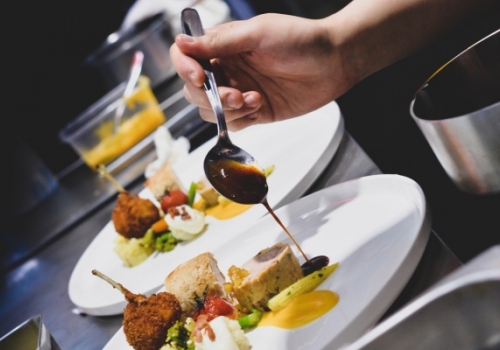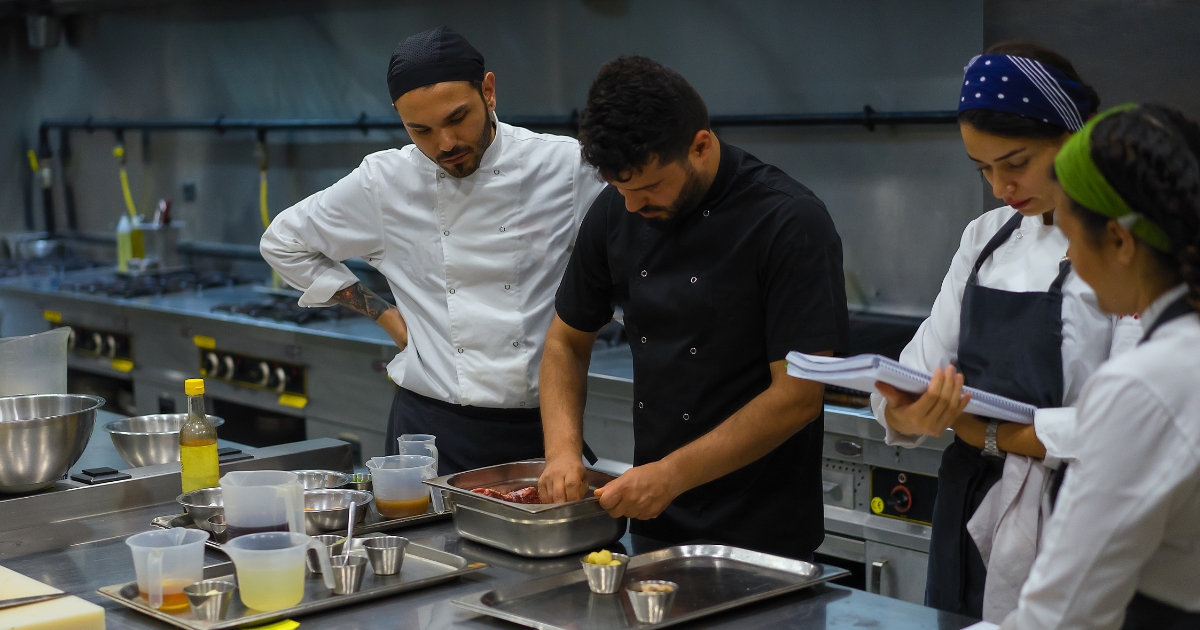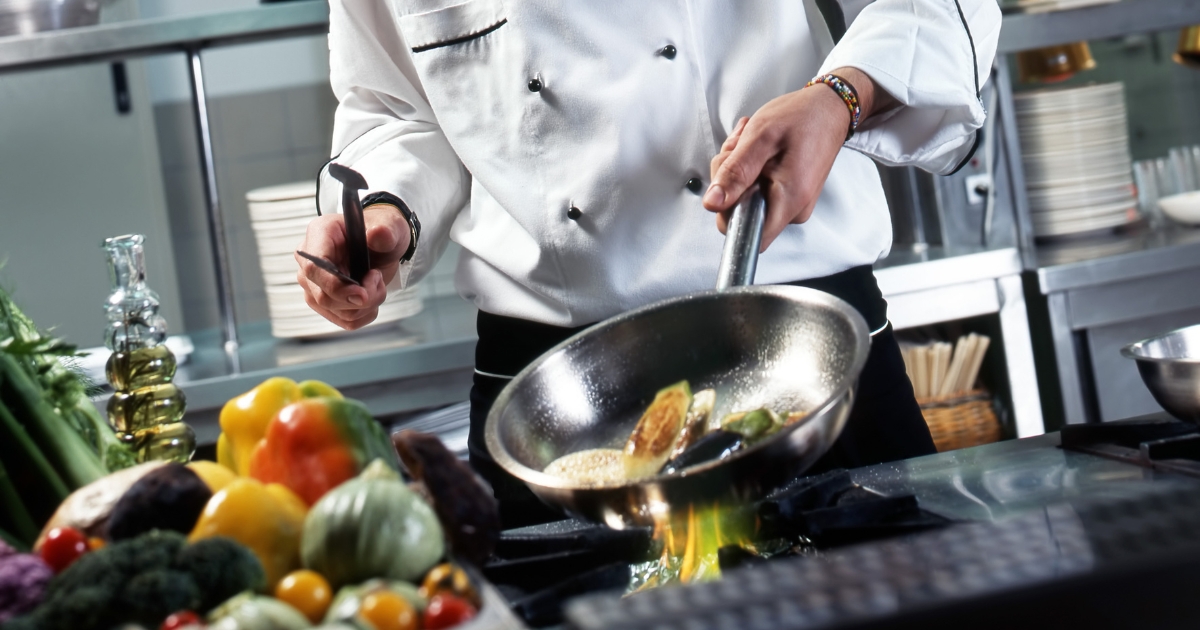The Quick & Easy Guide to Superyacht Chef Careers

This article is the latest instalment in our series of guides on superyacht careers. We’ve already covered deck, interior and engineering careers, but today it’s time to get delicious and discuss the career pathways for chefs on board yachts.
As always, the information in this guide is brought to you by the experts at the careers guidance platform, Academy by Ephemeris. Start or advance your yachting career with Academy by Ephemeris, the only online tool that connects superyacht crews and aspiring crew with yachting industry training providers worldwide.
What does a superyacht chef do?
A superyacht chef is in some ways, the central character in a guest or owner’s experience on board. They are the unsung heroes that use the culinary arts to turn yacht voyages into unforgettable memories, and it’s all done from the galley - the marine industry term for the onboard kitchen.
The chef’s primary responsibility is planning, preparing and cooking food for the guests/owner, the captain and the crew. But there’s a lot more to the chef’s job, too.
The chef’s daily responsibilities include regularly provisioning all required food items, which also entails frequent food inventory records to ensure that any food items required for a particular trip or charter booking, are ordered and delivered on time. They are also responsible for checking that all received food items meet the yacht’s standards, following which all items must be safely and correctly stored according to all required food safety and storage standards.
Galley safety and sanitary standards are also the chef’s responsibility, and if other galley staff are on board - as they may be on larger yachts - the chef is responsible for managing those staff, too.

How do I become a superyacht chef, what qualifications do I need?
Generally, you would begin by obtaining formal food preparation training, such as an NVQ (National Vocational Qualification) Diploma from the City & Guilds framework.
Next, you will need a minimum of a Level 2 Food Hygiene Certificate. This internationally accredited certificate is a mandatory requirement for all food handlers and servers. It teaches the basic knowledge of how to safely store, handle, cook and serve food onboard a superyacht in a hygienic and safe manner.
For chefs working on commercially registered yachts (charter yachts) and/or chefs cooking for 10 or more crew, a further requirement - the Ship's Cook Certificate – was introduced as part of the Maritime Labour Convention (MLC, 2006) in 2014.
Rather than being a course to teach superyacht standard food for guests, the Ship's Cook Certificate was created with the purpose of ensuring that cooks working on commercial vessels have the basic skills and knowledge to cook for the crew on board.
“The Ship's Cook Assessment for the Certificate is designed to ensure a basic minimum standard – it is not designed to catch people out. If you know how to cook and you operate using best practice, there is no reason why you will not pass the assessment,” explained Chef Duncan Biggs, MD of OceanWave Monaco.
In order to attain a Ship’s Cook Certificate, you will need the following:
- Proof of at least one month’s sea time, at sea or alongside.
- Proof of at least one year as a chef or as a cook in a professional working environment.
- Certificate of successful completion of the Assessment in Marine Cookery.
- Class-based Food Safety Level 2 (MCA - Maritime and Coastguard Agency) or Level 3 (Cayman Islands).
A formal competency check via the Ship's Cook Certificate of Competency is mandatory, even if you hold an SVQ (Scottish Vocational Qualifications) or NVQ Level 4 to UK standards.
All crew, including chefs, need an STCW (Standards of Training, Certification and Watchkeeping for seafarers) certificate in order to work on a yacht. This is a five day course that covers general safety at sea. You will also need to obtain an ENG1 medical certificate from a certified medical practitioner.

Is it better to start off working onshore?
The majority of yacht chefs train and develop their skills onshore first before pursuing a cheffing career at sea. Chefs who have had extensive training and career experience on shore, particularly if they have worked in fine dining or Michelin-starred restaurants, are highly sought-after on yachts.
Is cheffing at sea any different to cheffing ashore?
Yes, it’s very different!
A head yacht chef is responsible for meal planning, menu development, food provisioning and preparation, cooking and galley cleanliness. On smaller yachts, chefs often work alone, further adding to their workload.
Additionally, superyacht chefs - especially those on board charter vessels - need to have the ability to perfectly cook a wide range of cuisines and accommodate a wide range of dietary preferences, including gluten free, vegetarian, and vegan options, all prepared to a very high standard. Guests accustomed to dining in the world’s best restaurants expect a similar level of culinary perfection on board.
There are logistical differences, too.
If a chef onshore needs an ingredient at the last minute, it can often be sourced relatively quickly and easily - sometimes even from a nearby store. At sea, however, a chef must be prepared to be much more resourceful given that it’s more challenging to source provisions, particularly at short notice, so a missing or spoiled ingredient can otherwise quickly become a disaster. Though larger yachts typically have more galley staff, it is generally still not to the extent of kitchens ashore and even then, yacht chefs must simply be more resourceful while being prepared to be busy for longer hours every day.

What are the different roles within the yacht chef pathway?
Yachting’s culinary world offers several distinct roles.
Junior Chef: This role offers newly trained chefs a chance to familiarise themselves with the nuances of yacht kitchen operations while learning vital occupational skills from more experienced professional chefs. By assisting seasoned chefs, junior chefs lay the groundwork for their journey ahead.
Sous Chef: Positioned as the second-in-command to the head chef, the sous chef becomes the cornerstone of the galley, often stepping in to lead the culinary charge.
Specialty Chefs: For those with a unique culinary passion, such as pastries or sushi, specialised roles - when available - provide a platform for niche creativity.
Head Chef: At the apex of the galley staff hierarchy, the head chef orchestrates the galley's operations, ensuring every dietary requirement and preference is exquisitely catered to.
Conclusion
Climbing the ranks in the superyacht chef’s culinary world necessitates a commitment to continuous learning. Of course, exploration of diverse global cuisines and networking within the superyacht community can propel your career substantially, but getting started requires having the right training. That’s where Academy by Ephemeris comes in.
Using the Academy by Ephemeris platform, you can access the training you need to begin, develop or advance your chef yachting career - or any career on yachts - wherever you are in the world. Academy by Ephemeris is designed to connect you with the right courses from carefully vetted training providers worldwide, whenever you need them.
Finally, a big thank you to Chef Duncan Biggs at OceanWave Monaco for his assistance with this article.


Post your comment
You cannot post comments until you have logged in.
Login to post a commentComments
No one has commented on this page yet.
RSS feed for comments on this page | RSS feed for all comments